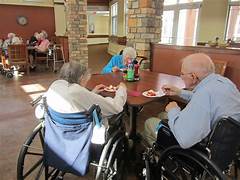The world of Social care and healthcare has changed drastically in recent years. The demand for quality care for residents in care homes and nursing homes has increased dramatically, and it is becoming increasingly difficult for care professionals to meet the challenge. However, digital education has emerged as a powerful and effective tool to ensure quality care for residents in care homes.
In this blog, I will discuss the exciting benefits of digital education in care homes and the best practices for successful implementation.
Introduction to Care Homes
Care homes provide a safe and secure environment for the elderly and disabled. They are staffed by care professionals who provide round-the-clock care and support for residents. Care homes provide a wide range of services including medical care, personal care, and social activities.
The primary goal of care homes is to ensure the safety and anwell-beingng of their residents. However, due to the increasing demand for care, care professionals often face challenges in providing quality care and support.
Benefits of Digital Education in Care Homes
Digital education has emerged as a powerful and effective tool to ensure quality care and support for residents in care homes. Digital education provides a wide range of benefits, including:
- Improved knowledge and skills: Digital education provides care professionals with the latest information and resources to help them deliver quality care and support. It also helps to develop their knowledge and skills in areas such as health and safety, communication, and problem-solving.
- Increased efficiency: Digital education enables care professionals to access and share information more quickly and easily. This helps to reduce costs and improve efficiency.
- Improved care: Digital education provides care professionals with the latest information and resources to help them deliver quality care and support. This helps to improve the quality of care for residents in care homes.
Examples of Digital Education in Care Homes
Digital education can take many forms, such as e-learning, webinars, and online courses. These can be used to provide care professionals with the latest information and resources to help them deliver quality care and support.
E-learning is an effective way to provide care professionals with the latest information and resources. E-learning courses are designed to be interactive and engaging, allowing care professionals to learn at their own pace.
Webinars are also useful for providing care professionals with the latest information and resources. Webinars are live, interactive sessions that allow care professionals to interact with expert speakers. Online courses are also useful for providing care professionals with the latest information and resources.
Quality of Care with Digital Education
Digital education can help to improve the quality of care for residents in care homes. The use of digital education enables care professionals to access the latest information and resources quickly and easily. This helps to improve their knowledge and skills, which in turn can lead to improved care for residents.
Digital education also provides care professionals with the opportunity to engage with experts and peers. This helps to develop their knowledge and skills, which can lead to improved care for residents.
Advantages of Digital Education
Digital education offers a wide range of advantages for care professionals and residents in care homes.
- Accessibility: Digital education is accessible to everyone, regardless of location or ability. This makes it easier for care professionals to access the latest information and resources.
- Cost-effective: Digital education is often more cost effective than traditional classroom-based learning. This makes it an attractive option for care professionals and care homes.
- Flexibility: Digital education is flexible and can be tailored to the individual needs of care professionals and care homes. This allows care professionals to learn at their own pace and schedule.
- Engagement: Digital education provides an engaging and interactive learning experience for care professionals. This helps to keep them motivated and engaged in the learning process.
Challenges of Digital Education
Digital education can present some challenges for care professionals and care homes.
- Accessibility: Digital education can be difficult for care professionals who lack access to the internet or have limited computer skills.
- Cost: Digital education can be expensive, particularly if care homes are not able to access free or low-cost resources.
- Technical issues: Digital education can also be hindered by technical issues, such as slow internet connections or unreliable hardware.
- Lack of engagement: Digital education can be less engaging than traditional classroom-based learning. This can lead to a lack of motivation and engagement in the learning process.
Best Practices for Digital Education in Care Homes
To ensure quality care for residents in care homes, it is important to follow best practices for digital education.
- Accessibility: Care homes should ensure that digital education is accessible to all care professionals, regardless of location or ability.
- Cost-effectiveness: Care homes should ensure that digital education is cost-effective. This can be achieved by using free or low-cost resources.
- Technical requirements: Care homes should ensure that the technical requirements for digital education are met. This includes ensuring that care professionals have access to reliable internet connections and reliable hardware.
- Engagement: Care homes should ensure that digital education is engaging and interactive. This can be achieved by providing interactive learning activities and encouraging care professionals to collaborate with each other.
Technology for Digital Education in Care Homes
Digital education requires the use of technology to deliver the latest information and resources. Care homes should ensure that they have the necessary technology to deliver digital education.
- Computers: Care homes should ensure that care professionals have access to computers for digital education. This can be achieved by providing laptops or tablets for care professionals to use.
- Internet: Care homes should ensure that care professionals have access to reliable internet connections for digital education. This can be achieved by providing Wi-Fi or installing broadband internet in care homes.
- Software: Care homes should ensure that care professionals have access to the necessary software for digital education. This includes e-learning platforms, webinar platforms, and learning management systems.
Strategies for Successful Implementation
To ensure the successful implementation of digital education in care homes, it is important to follow the best practices outlined above. Care homes should also develop strategies to ensure that care professionals are engaged and motivated in the learning process.
- Communication: Care homes should ensure that they communicate effectively with care professionals about digital education. This can be achieved by providing clear information and instructions about digital education.
- Support: Care homes should ensure that they provide support to care professionals. This can be achieved by providing one-on-one support or providing access to online resources.
- Feedback: Care homes should ensure that they provide feedback to care professionals. This can be achieved by providing feedback on course progress or providing feedback on the quality of care.
- Reinforcement: Care homes should ensure that they reinforce the importance of digital education. This can be achieved by providing rewards for the successful completion of courses or providing recognition for achievements.
Conclusion
In conclusion, digital education is a powerful and effective tool to ensure quality care for residents in care homes. It provides care professionals with the latest information and resources to help them deliver quality care and support. Care homes should ensure that they follow the best practices for digital education and develop strategies to ensure that care professionals are engaged and motivated in the learning process.
Digital education is an exciting opportunity for care professionals and care homes to improve the quality of care for residents. It is an exciting time for digital education in care homes, and I look forward to seeing the positive impact it will have on the quality of care.

